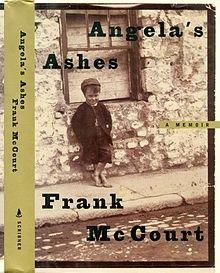Angela's Ashes by Frank McCourt - a childhood frozen in time
The word "warmth" barely appears in Irish-American author Frank McCourt's tragi-comic memoir, Angela's Ashes. A comfortable temperature plays a central role, largely because of the narrator's near-constant lack of it and his incessant desire for it.

by Frank McCourt
Scribner
The word "warmth" barely appears in Irish-American author Frank McCourt's tragi-comic memoir, Angela's Ashes. A comfortable temperature plays a central role, largely because of the narrator's near-constant lack of it and his incessant desire for it.
Supposedly autobiographical (it won the 1997 Pulitzer Prize in the biography or autobiography category), Angela's Ashes is an unflinching account of a deprived childhood. Told in first person, it is a harrowing tale of cold weather, cold houses and a cold bed, of cold potatoes, cold tea, icy cold baths, of catching colds and of dead siblings being "cold in the ground". It's so cold, the ragamuffin narrator hopes the fleas that disturb the sleep of his poverty-stricken family will "surely freeze to death". Even the sun is described, more than once, as cold.
The tale of woe begins in Depression-era Brooklyn, New York, where McCourt is born in 1930 of Irish parents Malachy, an ex-IRA man from Antrim, and Angela, from Limerick. In rapid succession Angela gives birth to another son, Malachy Junior, twins Oliver and Eugene, and daughter Margaret, who dies in infancy. Soon after the death, Malachy Senior moves the family back to Ireland (effectively going against the tide of history).
The McCourts find lodging on a dirt street of ramshackle Limerick slum houses. Their house is next to the reeking outdoor lavatory that serves the neighbourhood. The family's cramped room lets in the rain, and parents and children sleep on the same mattress. Young Frank is perpetually hungry.
The twins die but two more brothers arrive … and on it goes.